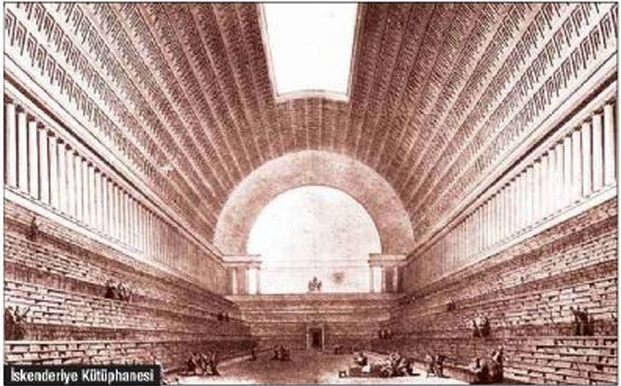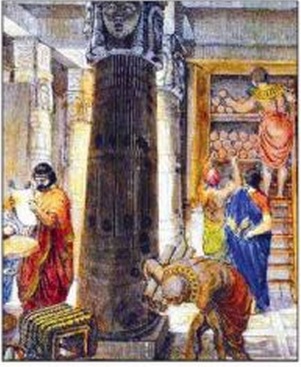(1).jpg)
THE LIBRARY OF ALEXANDRIA WAS NOT BURNED BY MUSLIMS
According to the legend, after the conquest of Alexandria in the year 642, Caliph Umar ordered the burning of the books in the city library to Amr ibn al-As, the conqueror of the city. Despite the objections of Yahya al-Nahwi (Ioannis Philoponos), Amr had the books burned in the four thousand bathhouses of the city. The baths were heated with these books for six months. This story is recounted by the Syrian Christian writer Bar Hebraeus (1226-1289), also known as Abu al-Faraj, and it was translated into Latin and published in 1663. This legend first gained prominence in Europe during that time.
First of all, until the centuries following the Arab conquests, paper had not yet reached Egypt. Most of the books at that time, if not all, were written on parchment which did not burn easily. Moreover, for the baths' stoves to be kept burning for such an extended period, it would have required at least 14 million books. During that era, such a vast number of books was simply not present. Additionally, Yahya al-Nahwi is believed to have lived a century before Amr ibn al-As. Furthermore, this event is not mentioned in the original Hebrew, abbreviated Syriac, or Arabic manuscripts of the time; it appears to have been added later, giving the impression of being inserted into the text.

Opportunity to Discredit Caliph Umar
Abu al-Faraj encountered this through the historian Ibn al-Qifti, who narrated the story in his biography of Ioannis. Ibn al-Qifti himself received it from Baghdad physician Abdullatif, who had traveled to Egypt in 1203. Abdullatif mentioned, "Beside the ruins of the Pharos of Alexandria, I saw certain columns. This must be the site of the library burned by Caliph Umar!" This visit coincided with the end of the Fatimid State. The Fatimids were inclined towards an extreme Shia sect influenced by philosophy. Portraying Caliph Umar as ignorant and uncivilized would have served their interests. Abdullatif may have been misled by these rumors.
When Salahuddin Ayyubi (Saladin) conquered Egypt, he ordered the burning of propaganda books related to the deviant beliefs of the Fatimids. Ibn al-Qifti's father was a judge in Egypt during this time. It's likely that while recounting these events, the story underwent a transformation. Ibn al-Qifti doesn't provide the number of bathhouses. This was fabricated by Abu al-Faraj. Amr ibn al-As had consulted Caliph Umar about what to do with some Greek books he had obtained. Umar responded, "If they contain useful knowledge, keep them; if not, burn them!" It is obvious that this incident has been misinterpreted to make a connection to the burning of books.

What Wouldn't Be Done for the Sake of Propaganda?
Such a significant event is not mentioned in the rich literature of the Islamic Middle Ages, nor in the works of the Church, Byzantium, or the Jewish sources. Even the historian Yuhanna, the Bishop of Nicaea, who lived in the late 7th century and held strong animosity towards Islam, does not utter a single word about this event. Claims like these are either born out of legends or deliberately fabricated. They serve the purpose of promoting an individual or a cause. For a propagandist, the emphasis lies on being impactful and persuasive, not necessarily on presenting the truth.
Papal authorities have claimed since the 8th century that the first Christian Roman Emperor Constantine bestowed all of Europe to Pope Sylvester through a decree; based on this, they sought to exert both religious and secular control over all kings. The authenticity of this document, known as the "Donation of Constantine," allegedly dating back to the 4th century, was exposed as a forgery in the 15th century. In 1440, the humanist Lorenzo Valla examined the document and revealed that it was a fabrication from the 9th century. As a result, kings started to reject the secular authority of the popes one by one.
The Protocols of the Elders of Zion, which supposedly describe Jewish plans for world domination, were also fabricated by the secret police of Tsarist Russia based on a French novel. By attributing revolutionary plots to Jews and Jewish ideas to revolutionaries, they attempted to attack these two prominent adversaries. The so-called Protocols have been widely exploited by Nazis and imitators to legitimize hatred and persecution in various places.
Despite being repeatedly proven false by historical evidence, the burning of the Library of Alexandria incident remains a favorite tool of propagandists. It continues to serve as a means to depict the respected Caliph Umar as a destroyer of libraries, tarnishing the image of Islam and promoting anti-Islamic propaganda. Interestingly, even some Muslims have uncritically embraced this claim. However, in recent times, European orientalists have debunked this narrative, thereby exonerating Caliph Umar and the early Muslims from this false accusation.
Who Actually Burned It?
The destruction caused by Theophilos was falsely blamed on Muslims. But who actually burned the Library of Alexandria? Or did it really burn? This library was founded by Alexander the Great in 332 BC. It was a marble building in the palace gardens. At that time, it housed 900,000 works, making it the richest library on Earth. Its curator had the authority to buy any desired work. Every book brought to Egypt was first taken there to make a copy. When the Romans invaded Egypt, the library was destroyed along with the palace.
After the advent of Christianity, Theophilos, the Roman governor of Egypt, wanted to build a church on the site of this library in the year 391. During excavation, an ancient Egyptian temple stone was discovered. This incident led to conflicts between Christians and local Egyptians. The events escalated into a rebellion, resulting in many casualties. Theophilos sent troops and suppressed the rebellion. He destroyed the area where the library was located and ordered the remaining old books scattered around to be burned in the furnaces of bathhouses. Unfortunately, the blame for this act of Christians who respect knowledge and history has been wrongly attributed to Muslims.
Önceki Yazılar
-
“FASTING WAS MADE OBLIGATORY ALSO UPON THOSE BEFORE YOU”25.02.2026
-
WHAT WAS THE LAW OF THE OTTOMAN EMPIRE?18.02.2026
-
WOMAN IN THE EASTERN WORLD11.02.2026
-
THE OTTOMAN DYNASTY OWES ITS LIFE TO A WOMAN4.02.2026
-
THE WATER OF IMMORTALITY IN THE “LAND OF DARKNESS”28.01.2026
-
THE WORLD LEARNED WHAT FORBEARANCE IS FROM SULTAN MEHMED II21.01.2026
-
THE RUSH FOR GOLD14.01.2026
-
TRACES OF ISLAM IN CONSTANTINOPOLIS7.01.2026
-
WHO CAN FORGIVE THE KILLER?31.12.2025
-
WHEN WAS PROPHET ISA (JESUS) BORN?24.12.2025